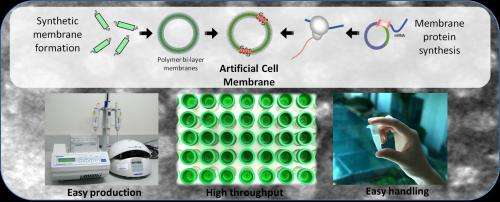Artificial cell membranes that can speed up drug discovery

ACM Biolabs, a spin-off company from A*STAR's Institute of Materials Research and Engineering (IMRE), will market novel plastic cell membranes to be used as low-cost, easily maintained drug targets that help shorten the drug discovery process. What usually takes weeks or even months can now be done in a matter of days using these new materials. Combined with a robust scalability to large scale quantities, ACM's artificial cell membranes may cut costs in the initial phase of drug discovery by up to two-thirds.
Artificial cell membranes (ACMs) are customised synthetic cell membranes that mimic live, targeted membrane proteins. The new technology allows the production of membrane proteins without the need for the specially controlled environments, conditions and training that is required in current live cell culture laboratories. ACM Biolabs' products, which can be tailor-made to a pharmaceutical company's specific drug testing requirements, are produced rapidly and are stable over a long period, leading to significantly reduced costs and streamlining of the currently tedious and cumbersome drug discovery process. The patented artificial cell membrane technology was first developed at A*STAR's IMRE in 2009 by integrating biology with innovative materials science know-how and is now licensed to ACM Biolabs.
Cells communicate with each other and exchange vital molecules through their 'skin' or membranes, facilitated by specific proteins, or membrane proteins. Disruption of the communication pattern can lead to diseases such as cancer, diabetes, obesity, and Parkinson's Disease. Understanding the working of membrane proteins is critical in creating medicines to combat diseases. ACM Biolabs has adapted natural cellular processes to invent a simple yet functional system, where synthetic materials are engineered to host membrane proteins. These include some membrane proteins that cannot currently be produced in a stable form using today's cell-based technology, i.e. the so-called 'hard targets'.
"Our proprietary artificial cell membrane technology is a unique combination of engineered polymer materials and biology that gives pharmaceutical companies a faster, cheaper alternative to current drug discovery methods," said Dr Madhavan Nallani, a former IMRE scientist who is the founder and now the Director of ACM Biolabs, which produces these patented artificial cell membranes with customised membrane proteins.
"Our aim is to lower the entry barrier for more companies and labs to screen novel drugs, or test existing drugs on novel targets", added Dr Nallani. "ACM Biolabs believes that our product can reduce the risk from some of the more daunting phases in the drug discovery process and allows the creation of a new generation of innovative drugs."
"The commercialisation of this technology is an excellent example of A*STAR's plan to push lab-based research into the marketplace," said Prof Andy Hor, Executive Director of IMRE. "The success of this spin-off is also part of our efforts to create a generation of scientist-entrepreneurs that can help lead Singapore's charge in a future knowledge-based economy".
ACM Biolabs targets the drug discovery industry, especially the life science tools market, which is worth an estimated US$42 billion[1] 2015. The market potential is huge, especially for disruptive technologies like Artificial Cell Membranes, since the majority of known membrane proteins have yet to be explored as drug targets partly due to the difficulties in studying them in live cells. This serves as a validation for the company's technology and also grows the company's acceptance as a market provider of products and partner for expertise in membrane protein targets. currently. Its technology will significantly impact the membrane protein related assays in the cell biology sector, which accounts for a third of the life science tools industry revenue.
The award-winning Artificial Cell Membrane technology was first recognised as a finalist in the prestigious Asian Innovation Awards 2011 organised by The Wall Street Journal Asia. ACM Biolabs went on to win the "Most Innovative Start-up" award for its potential application in membrane protein drug screening analysis at the Action Community for Entrepreneurship (ACE)-ETPL Investor Forum held in June 2012. ACM Biolabs has also recently secured a SPRING Technology Enterprise Commercialisation Scheme (TECS) Proof-of-Value grant worth S$500,000 to help grow the start-up.




















